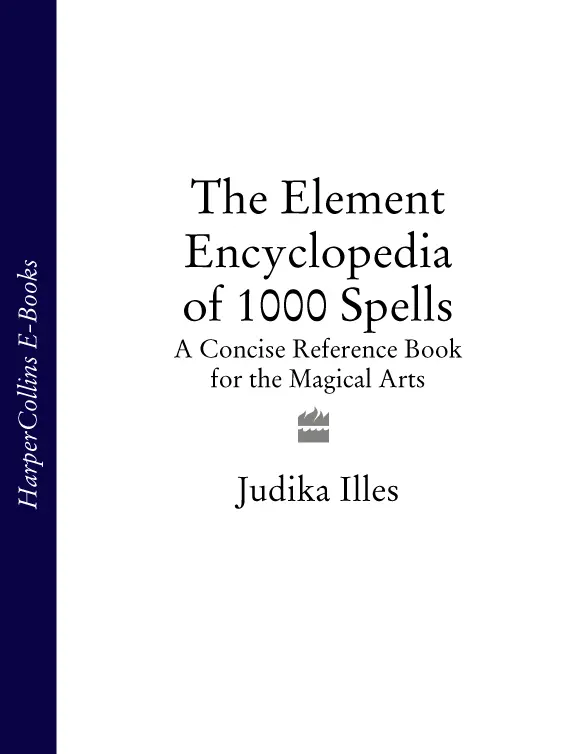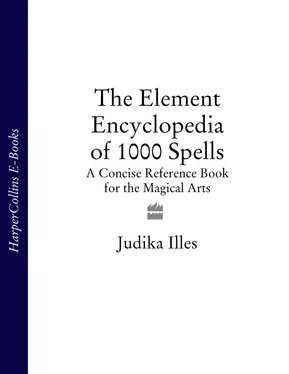
The Element Encyclopedia of 1000 Spells
Judika Illes

For Herta and Zoltan Illes, and Rachel and Jordan Nagengast, without whose love, patience, and support, this book could never have been written.
Cover Page
Title Page
Dedication
WARNING!
Preface
Introduction
Elements of Magic Spells
Spell-casting
Key Concepts for Casting Magic Spells
Ritual Tools and Techniques
Animal Spells
Banishing Spells
Better Business and Professional Success Spells
Cleansing Spells
Death Spells
Dream Spells
The Evil Eye
Fertility: Spells for Conception and Contraception
Happy Home Spells
Healing Spells
Hexes and Their Antidotes
Love Magic
Luck and Success Spells
Marriage and Divorce Spells
Money Spells
Pregnancy and Childbirth Spells
Protection Spells
Unblocking Spells
Youth, Beauty, and Longevity Spells
Formulary
Copyright
About the Publisher
The Element Encyclopedia of 1000 Spells contains an overview of magical spells and practices from a multitude of eras, traditions, and places. It is intended as an inclusive encyclopedia and reference book. Many of the spells contained within these pages are not to be used and should not be reproduced. Some involve dangerous, potentially harmful, and deadly poisonous botanicals. The author and the publisher strongly advise against using any spells containing noxious substances or poisonous botanicals, or spells containing blood (the use of which could result in the transmission of blood-borne diseases which may be fatal). These spells are only reproduced here to provide a historical context.
Any reader uses the spells entirely at their own risk and the author and publisher accept no liability if the spells do not have the desired effect or if adverse affects are caused.
THIS BOOK IS NOT SUITABLE FOR CHILDREN.
The image is so familiaras to qualify as an archetype. It appears in countless movies, television shows, and theatrical productions. If you’re of a literary bent, you’ll find it in countless novels, too. Although there may be variations on the theme, the core image remains consistent: someone, usually but not always a witch or wizard, faced with a serious dilemma, reaches for a massive book of magic spells.
The contents of this book are rarely displayed. (An exception occurs on the television series, Sabrina the Teenage Witch . As befitting a twenty-first-century witch, Sabrina’s edition is interactive.) Oversized, well-worn, and clearly used , this book is obviously no coffee-table book but a familiar companion—in every sense of the word “familiar.” Sabrina’s book makes almost as many appearances as her black cat, and consistently proves more reliable.
The book’s very presence transmits subliminal messages. If there were previously any doubts regarding someone’s identity, then the act of reaching for the book, mere possession of this book in fact, is usually sufficient to establish occult credentials. Consider depictions of Merlin or Morgan le Fay: their big books of spells are as much a part and parcel of their magical trappings as any animal familiar, crystal ball, or wizard’s robes. Millions of kitschy statues feature an elderly gray-bearded man clutching a massive book. He may or may not be wearing his peaked wizard’s hat but his identity is clear. How do we know he’s a wizard? By the book that he holds.
This book thus signals that its reader is a metaphysician or is striving to be one. If the reader handles the book with comfort and ease, the implication is that he or she is a person of power. The book, however, can also compensate for the reader’s very lack of experience and knowledge. One frequent variation on the theme depicts a complete novice discovering sophisticated magical solutions within the book’s pages. Typically the novice is in way over his head in disaster. The very appearance of the book signals that salvation is at hand: the secrets of salvation are contained within the book’s pages, if only the novice will follow its directions. (Conversely, Mickey Mouse’s inability to use such a book for anything other than a flotation device in The Sorcerer’s Apprentice only underscores his magical ineptitude and general incompetence.)
This spell book thus possesses transformative powers. It can transform anyone (well, Mickey excepted) into a magical adept. Its aged, well-worn appearance also indicates that this book is timeless: it never outlives its usefulness.
This archetypal book is based on both fact and fantasy.
Collections of spells rank among Earth’s earliest written documents. Not only are magical texts among the oldest surviving pieces of literature, but many scholars and anthropologists suggest that it was the need to record spells and divination results that stimulated the very birth of writing. Magic, as we will see, is the true mother of invention. In ancient Egypt, the lunar god Thoth is credited as the inventor of both magic and writing. He is the patron of scribes and magicians. It was rumored that in addition to inventing the systems of spelling and writing, Thoth created the very first book, authoring no less than a sacred revelation of Earth’s most powerful secret spells and rituals. The legendary Book of Thoth was believed to hold the key to all the secrets of the universe. To possess a copy of the book enabled one to command and control destiny itself.
The ancient Egyptians loved stories featuring books of power. Several of their legends remain to us, including the original version of Walt Disney’s The Sorcerer’s Apprentice . Egypt, at the time, was a theocracy: religion and government were one. The reigning pharaoh was simultaneously the child of the god, the living embodiment of the god, and the god’s foremost high priest, and vast temple complexes, financed by the state, contained literary annexes known as Houses of Life .
These combination scriptoria/emergency clinics housed wizard priests, on the government payroll. For a fee, these professional magicians would consult their extensive library of magic texts to provide their clientele with enchanted solutions to life’s many dilemmas. Perhaps, legend had it, the Book of Thoth was hidden in the depths of one of these magic libraries. Perhaps it was stashed in some priest or pharaoh’s tomb. Or perhaps it was eventually deemed so dangerous that, too powerful to destroy, the book had been locked into a chained, weighted iron box and thrown into the depths of the sea.
Access to occult knowledge bestowed power and prestige. The magical texts were hoarded and kept secret. Many were written in code, to prevent profane eyes from understanding what was read.
A few centuries before the dawning of the Common Era, the independent Egyptian nation was defeated, first by the Persians, then by the Greeks and Romans. Indigenous Egyptian religion and political structure degenerated. The Houses of Life were abandoned; the lucrative, respected profession of government-employed wizard-priest no longer existed. It was the last time in history that working with magic was a secure, respectable profession.
Читать дальше














